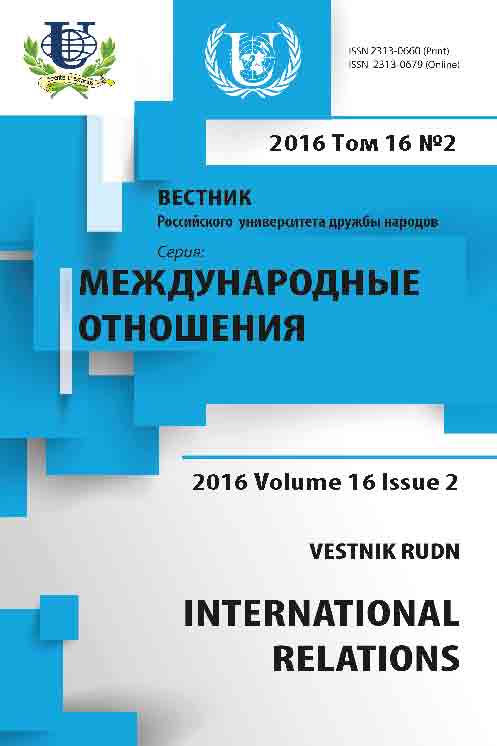Sub-Saharan Africa at the global education market: role of South Africa
- Authors: Asmyatullin R.R.1
-
Affiliations:
- People's Friendship University of Russia
- Issue: Vol 16, No 2 (2016): Africa in International Relations
- Pages: 365-374
- Section: Articles
- URL: https://journals.rudn.ru/international-relations/article/view/14284
Cite item
Full Text
Abstract
This article is dedicated to the development of the higher education in Sub-Saharan countries, particularly to the topic of internationalization of education. Most African countries have underdeveloped education systems. The quality and availability of higher education is a formidable obstacle for economic and social development. There is a growing demand for higher education in the SSA, but national education systems can’t cope fully with it. Hence many students go abroad, mostly in other African countries. The article focuses on the position of South Africa in the global and regional education market. As it’s a regional leader in this field South Africa attracts more than a half of international students within the Sub-Saharan Africa. The main reasons why African students choose South Africa are geographic proximity, familiar culture, lack of wanted higher education programs in their countries. However, there are as well disadvantages like xenophobia and race discrimination. South Africa has become a leader in Africa in the field of higher education, but it plays still small part at a global scale.
About the authors
Ramil Ravilevich Asmyatullin
People's Friendship University of Russia
Author for correspondence.
Email: asmyatullin_rr@pfur.ru
Moscow, Russia
References
- Adedayo F.O., 2015. Recruiting from Nigeria: Market Trends and Future Potentials. ICEF Dubai Workshop.
- Aidrous I.A., 2015. Osobennosti razvitiya mirovogo rynka obrazovatel'nykh uslug na sovremennom etape: monografiya [Peculiarities of development of the global education services market in the modern era: monograph]. Moscow, PFUR, 320 p.
- Andreeva A.V, Parfenova S.V., Syul'kova N.V., Yurtaev V.I., 2014. Kontseptsiya setevogo universiteta BRIKS. [Concept of the BRICS Universities League]. BRIKS: sotrudnichestvo v tselyakh razvitiya. Materialy IV Mezhdunarodnoi nauchnoi konferentsii. Moscow, PFUR, pp. 172-178.
- Battaglino T. B., Haldeman M., Laurans E., 2012. The Costs of Online Learning. Washington DC, The Thomas B. Fordham Institute, 14p. Available at: http://edex.s3-us-west-2.amazonaws.com/publication/pdfs/20120110-the-costs-of-online-learning_7.pdf (date of access: 15.01.2016)
- Bhekithemba Richard Mngomezulu, 2012. Politics and Higher Education in East Africa (From the 1920s to 1970). Bloemfontein, SUN Press, 288 p.
- Filippov V.M., 2015. Internacionalizacija vysshego obrazovanija: osnovnye tendencii, problemy i perspektivy [Internationalization of higher education: major trends, challenges and prospects]. Vestnik RUDN. Serija «Mezhdunarodnye otnoshenija», no. 3, pp. 203-211.
- Gokulsing D., 2011. Higher Education in the Context of Globalisation in Mauritius: An academic perspective. Available at: http://tec.intnet.mu/pdf_downloads/confpaper/conference2011/confpaper11.pdf (date of acces: 01.03.2016)
- Kandiko C.B., Weyers M., 2013. The Global Student Experience: An International and Comparative Analysis (International Studies in Higher Education). Routledge, 304 p.
- Mamdani M., 2007. Scholars in the Marketplace: The Dilemmas of Neo-liberal Reform at Makerere University, 1989-2005. Dakar. Codesria, 316 p.
- Mda T.V., Snyder I., Nieuwenhuysen J., 2011. A Home Away from Home? International Students in Australian and South African Higher Education. Monash University Publishing, 174 p.
- N’dri T., 2006. Assié-Lumumba. Higher Education in Africa. Crises, Reforms and Transformation. Dakar. Codesria, 204 p.
- Poruchikov S.I., 2015. Rol' Afrikanskogo sojuza v regulirovanii processov uchebno-professional'noj mobil'nosti na afrikanskom kontinente v nachale XXI v. [The role of the African Union in the regulation of educational and professional mobility on the African continent at the beginning of the XXI century]. Vestnik Tambovskogo universiteta. Serija: gumanitarnye nauki, no. 10 (150), pp. 137-143.
- Rodionova I.A., Monge Je., 2014. Problema preodolenija social'no-jekonomicheskoj otstalosti razvivajushhihsja stran na primere Tanzanii [Problem of overcoming socio-economic backwardness developing countries (case of Tanzania)]. Vestnik RUDN. Serija «Mezhdunarodnye otnoshenija», no. 2, pp.158-168.
- Ssempebwa J., Ssegawa D.E., 2013. Funding Higher Education in Uganda: Making the Case for the Liberalisation of Student Fees. Funding Higher Education in Sub-Saharan Africa. Palgrave Macmillan, 372 p.











